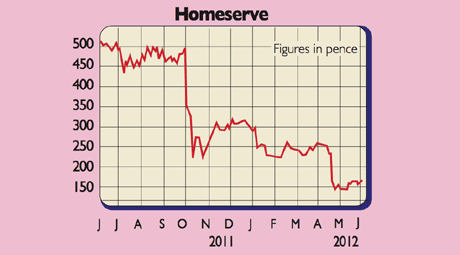Gamble of the week: Unloved home emergency services provider
Buying shares in unpopular firms can be a good way to make money, says Phil Oakley. And they don't come much more unloved than this home emergency services provider.
Get the latest financial news, insights and expert analysis from our award-winning MoneyWeek team, to help you understand what really matters when it comes to your finances.
You are now subscribed
Your newsletter sign-up was successful
Want to add more newsletters?

Twice daily
MoneyWeek
Get the latest financial news, insights and expert analysis from our award-winning MoneyWeek team, to help you understand what really matters when it comes to your finances.

Four times a week
Look After My Bills
Sign up to our free money-saving newsletter, filled with the latest news and expert advice to help you find the best tips and deals for managing your bills. Start saving today!
Buying shares in unpopular firms can be a good way to make money. The shares of home emergency services provider Homeserve are currently loathed by the stockmarket. It is embroiled in a misselling scandal and is currently under investigation by the Financial Services Authority (FSA).
Professional investors are worried about the prospect of a hefty fine, big compensation payments to customers and permanent damage to its reputation. The business faces a lot of uncertainty and risk, but could it still be a profitable investment from here?
At 158p, the shares are nearly 70% lower than they were a year ago. Few City analysts advise buying, with the majority sitting on the fence and few saying "sell". In response to the ongoing FSA investigation, Homeserve has set about shrinking its British business to a more manageable size.
MoneyWeek
Subscribe to MoneyWeek today and get your first six magazine issues absolutely FREE

Sign up to Money Morning
Don't miss the latest investment and personal finances news, market analysis, plus money-saving tips with our free twice-daily newsletter
Don't miss the latest investment and personal finances news, market analysis, plus money-saving tips with our free twice-daily newsletter
It seems that in the past the company was trying to offer its customers too many products and didn't have the resources to do this properly. It now wants to be a simpler, more profitable business focused on services such as plumbing, boiler cover and home emergency cover. It's getting out of businesses such as electrical goods warranties.
This will come at a cost. The number of customers in Britain is expected to shrink from three million to nearer two million. This means that profits are expected to keep falling for at least the next two years. On the positive side, Homeserve has been building businesses in France, Spain and America in recent years and profits seem to be growing nicely.
Homeserve (LSE: HSV)

But what about the damage to Homeserve's reputation? As with most insurance products, trust is crucial. A couple of winters ago it was unable to cope with a surge in the number of broken boilers caused by the cold winter. Customers who were let down are unlikely to return in a hurry, if ever.
If Homeserve is found guilty of selling insurance to people who didn't need it, then its British business could be damaged beyond repair. Then there's the issue of value for money. Homeserve makes a lot of money from insuring household water supply pipes the pipe that supplies clean water from the water main to your taps. But do customers really need this cover? The water supply pipe is the responsibility of the house owner, but it's unlikely to need repairing often.
However, a lot of these issues are already reflected in the share price. City analysts expect earnings per share to fall from 28p last year to 23.2p in 2013 and 20.8p in 2014. That puts the shares on a 2014 price/earnings ratio of 7.6 times. But dividends are expected to keep on growing to 11.3p next year and 11.6p per share in 2014, giving the shares an attractive 7.3% yield.
Investors are probably right to be wary of Homeserve, but if sentiment towards the company improves even slightly, the shares could go a lot higher.
Rating: BUY at 160p
Get the latest financial news, insights and expert analysis from our award-winning MoneyWeek team, to help you understand what really matters when it comes to your finances.
Phil spent 13 years as an investment analyst for both stockbroking and fund management companies.
-
 8 ways the ‘sandwich generation’ can protect wealth
8 ways the ‘sandwich generation’ can protect wealthPeople squeezed between caring for ageing parents and adult children or younger grandchildren – known as the ‘sandwich generation’ – are at risk of neglecting their own financial planning. Here’s how to protect yourself and your loved ones’ wealth.
-
 What are Avios-only flights and who is eligible?
What are Avios-only flights and who is eligible?Avios-only flights have proved incredibly popular since launching in 2023. We explain what they are, how they work and who qualifies